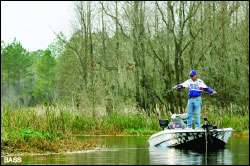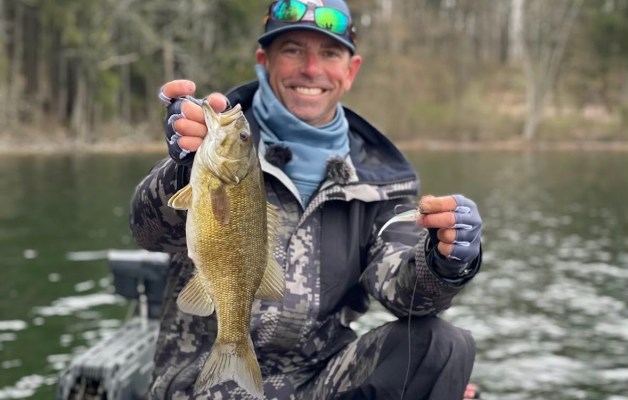
If catching fish was as easy as it looks on TV, anyone could be a bass pro and have his own fishing show.
But it isn't.
The reality of bass fishing in public waters is that it's hard more often than it's easy. Sure, there are great days that produce memorable catches, and there are pretty good days in which enough fish bite to make us happy.
Unfortunately, there are too many of those dreadful days when bass just won't bite. So, what do you do?
Well, you could call it a day and hope for a better tomorrow. Or, you could bear down like the pros and turn the odds in your favor.
"In our business," says veteran pro Denny Brauer, "you won't last long if you quit and go home. You survive by finding a way to make a few fish bite."
The pros know about tough bites, facing just about every fishing condition imaginable during the course of the season. Yet, as bad as fishing can be, someone always manages to catch them.
How do they make stubborn bass bite? Here are steps you can take when bass are uncooperative:
Make mental adjustments
Fish that won't bite are hard on one's confidence. Anglers who can fight off a defeatist attitude are more likely to recognize opportunities that are afforded to them and find a way to salvage the day.
"I'm one who prefers it when fishing gets supertough and the bites are hard to come by," explains Brauer. "When the fish are aggressive, anybody can catch them."
If nothing is happening in an area where you've caught fish recently, he adds, step back and try to figure out why you're not getting bites.
"Taking time to assess the situation will lead you closer to the answer as to how to catch them," Brauer describes. "If it's fishing pressure, maybe you need to find an area where they aren't getting beaten up as badly. If it's a weather issue, then slow down and fish more methodically."
Don't assume that the fish moved to the other side of the lake, adds Oklahoman O.T. Fears. Bass don't make big moves when conditions suddenly get tough, but they will reposition to a nearby location that provides them more comfort.
For example, if you've been catching them under overcast conditions and it gets sunny, bass will move closer to cover and are less likely to chase a bait.
"The strike zone gets smaller, so you must be more precise with your casts and coax them into biting," Fears adds.
However, abrupt changes in a lake during a seasonal change may cause fish to move farther distances. During spring, spawning bass will relocate quickly in the wake of rising, falling or muddy water, or abrupt temperature changes.
"If you sense that's the case, look around and think, 'OK, where did they go?'," says Brauer.
Panic definitely isn't the answer, insists Texan Jay Yelas. Fight off those emotions and fish with confidence.
"Panic is a terrible emotion when you're fishing, especially in a tournament situation when you're up against the clock," he offers. "Fight off the urge to run around the lake, jumping from spot to spot. That rarely works when the fish aren't biting. Get in an area where the fish have been living and pick it apart."
Fish heavy cover
If there's one strategy pros adopt when confronted by brutal conditions, it's the heavy cover pattern. Sulking fish will pull into the thickest cover available and you have to go in after them.
"This is when you must change your focus of where to make the majority of your presentations," says Brauer. "You're not going to catch fish next to those obvious targets, so don't waste time casting to them. Look for the high percentage places — those that are hard to get to but are most likely to hold a bass."
Heavy cover can be everything from thick vegetation, brush tops, gnarly stumps and logjams.
"Vegetation may be the best place of all," says Floridian Shaw Grigsby. "Most grass mats open up along the bottom but provide a real good security blanket on top. Bass love that when they're in a negative mood."
Bass burrowed in heavy cover feel more secure and are vulnerable to baits that drop into their safety zone. That's when Yelas turns to plastics.
"It's a good time to fish treated plastics, like Berkley's Power Baits or Gulp lures, because they provide additional incentive for the fish to hang on to them," says Yelas.
Be thorough and slow down
Patience is a virtue when fishing for bass that don't want to bite. Most anglers get antsy, fishing faster through potential areas in an attempt to cover more water.
"That can work against you," insists Yelas. "You really have to discipline yourself to slow down."
For example, the Carolina rig becomes his choice for catching stubborn bass around deep, rocky points or the edges of grassbeds.
"That's a good technique when the bass are kind of lethargic during the postspawn period," he says. "The fish are catchable, but won't swim far to eat. It may take me five minutes to work my bait on each cast, but I know that's going to get more bites than fishing it fast."
Anglers who pitch or flip lures to shallow targets need to take longer between pitches and flips, says Grigsby. The bass aren't anxious to eat, so don't rush to take it away from them.
"It's a matter of soaking the bait for longer periods in the same spot," he explains. "That's why it's so important to choose targets carefully. You want to make the most of each cast."
Make multiple presentations, especially to those areas where a bass is likely to hide. The strike zone is much smaller, so cover every inch.
"Present your bait from different angles, too," offers Brauer. "There are times when a bait presented from a different direction can trigger the reactionary bite you're looking for."
Entice the strikes
Grigsby suggests anglers try a number of presentations, from deadsticking the bait on the bottom to shaking it, or better yet, a combination of both.
"You've got to understand that you're not going to get a lot of bites, but they are going to be nice fish, and that will make the day worthwhile," he explains.
When fishing fast movers like spinnerbaits and crankbaits, use the bottom or cover to deflect lures and create erratic movement that can attract reactionary strikes.
Ohioan Joe Thomas also likes to "invade their space" when fishing jerkbaits for Great Lakes smallmouth.
"It works really well when there's a breeze on clear water, breaking up the surface outline," he describes. "Smallmouth will position themselves next to a clump of grass, boat dock or in the shade of an object."
He makes long casts past the target and into the sun-drenched shallows, trying to shield the jerkbait from the fish until the last second.
"Bring it next to the shady spot, then pop it into the fish's face with a couple of short, erratic twitches," he describes.
Downsize your lures
One of the first steps Fears takes is to downsize lures and line, especially if he suspects the bite is off due to cold fronts or fishing pressure. Finesse tactics, he says, will produce at least a few bites.
"This is when the drop shot really shines," he offers. "I may also go to a Mojo rig (small weight a foot ahead of a soft plastic bait), smaller crankbaits or even compact spinnerbaits."
Brauer agrees, noting that there are times when a lighter and more compact jig will generate strikes better than a big, bulky jig.
"It will get more bites from lesser quality fish, but on tough days, smaller fish are better than no fish at all," he explains.
Rotate locations
Bass will shut down during the hot periods of summer or early fall, but don't let that discourage you. They still eat, but not as often.
"When the water gets in the upper 80s and hotter, fish are less active because it burns up their metabolism," Yelas explains. "They feed, but for shorter periods."
That's why 2002 Bassmaster Classic winner Yelas rotates fishing spots, keying only on those where he knows the fish live.
"Under these conditions you don't have to worry about slowing down or scaling back your lure size, because when they do feed, they'll eat anything," he offers. "I may have four to six places that I keep visiting with hopes of being on one when the fish turn on."
If you can accept the conditions, stay confident and fish with patience, you're going to catch fish, insist the pros.
"The secret to being a good angler isn't knowing how to catch fish when they're biting," says Brauer. "It's being able to catch them when they're not."





